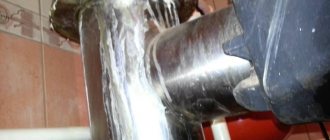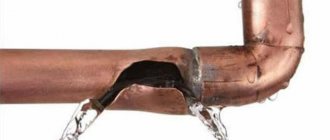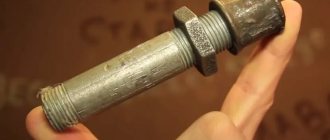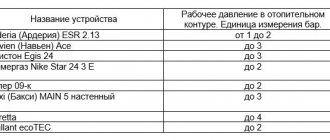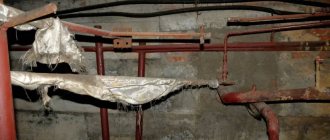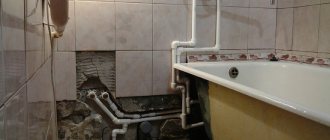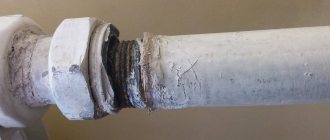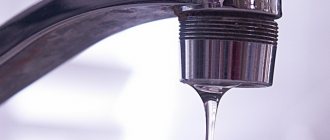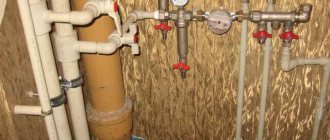Why are the batteries buzzing?
Nobody can definitely tell you why the water in the radiators of multi-storey buildings or private households makes noise, making a hum, a whistle or a constant hum. There are a huge number of reasons, but let’s look at the main ones.
If your home's hydraulics are not properly balanced, annoying noises can occur. All houses that are connected to the central heating main are connected to each other. For normal distribution of coolant, balancing valves of different diameters are selected and throttling nuts are installed at the entrance to each house.
When technicians select the wrong nut or adjust the valve incorrectly, the coolant does not reach the top floors and travels through the pipes very quickly. The accelerated circulation causes sounds similar to the hum coming from batteries. Why else can water make noise in radiators? Read on.
When renovation work is carried out on the technical floor of an apartment building, problems may arise. The humming noise can be caused by increasing the number of pipe transitions without balancing the hydraulics or by using smaller diameter pipes. The solution in this case is to call a plumber, who must resolve the issue at a professional level. Each case is individual, but most often the situation is solved by installing a new balancing valve in front of the risers.
If you don't know what causes water noise in batteries, it may be you. For example, you tried to regulate the coolant inlet into the apartment yourself using a balancing valve. This should be done by specialists. To correct the situation, you need to change the adjustment or call a technician who will quickly cope with the task.
Types of extraneous sounds in the heating pipeline
Under the influence of various factors, noise can appear not only in batteries, but also in heating pipes. At the same time, both metal and metal-plastic pipes can sound equally unpleasant.
Extraneous sounds in the heating pipeline may appear:
- Murmuring.
- Rattling.
- Crackling.
- Clicks.
- Gurgling.
- Noise.
- Howling.
- Whistling.
- With a knock.
Often such noises indicate serious problems in the heating system, which require timely diagnosis and elimination.
The pipes howl and hum
The most common type of noise is when pipes suddenly begin to hum, this is especially noticeable at night. The probable cause of the buzzing and howling is a coolant leak. To identify the source of the leak, each apartment is carefully checked for its riser, as well as the basement. In a private house - any room in which a heating radiator and boiler room are installed.
If a malfunction is detected in the operation of the system in an apartment building, residents have the right to complain to the management company or condominium association for repair work. In a private house, repairs to the system are carried out at the expense of the home owner.
Another reason for humming may be the different diameters of the pipes that were used to organize the pipeline. In such a case, the problem area is replaced with a larger diameter pipe.
Clicking, crackling and bubbling in pipes
In most cases, blockage with small particles of debris or sludge leads to cracking and clicking sounds in the pipes. A characteristic sign of clogging is also a dull click.
To ensure that the pipeline stops clicking, the system is thoroughly flushed. To do this, the coolant is completely drained through the drain valve into the sewer, and the pipeline and heating circuit are washed with clean water.
An equally serious cause of cracking and clicking is a broken valve or its incorrect installation. The simplest solution is to install a new device. To prevent a similar problem in the future, it is recommended to use ball valves, which are characterized by increased strength and resistance to blockages.
The pipes gurgle and whistle
Often, when there are air pockets, the pipes whistle, and the coolant in the system begins to make a characteristic murmur. Air can enter the heating circuit and pipes during repairs through leaky connecting elements. In addition to the constant babbling of water, there may be insufficient heating of the heating equipment to maintain the optimal temperature in the room.
The problem is solved by bleeding excess air from the heating system through the Mayevsky tap. The hot coolant is supplied under high pressure, so water is collected in a prepared container in small portions.
Pipes knock and rattle
The cause of knocking in the heating system may be insufficient fixation of fasteners for pipes or radiators. The passage of coolant through the system can cause even slight vibrations, which lead to rattling and knocking. The problem is solved by ensuring rigid fixation of supports for all elements of the system in each individual room.
Sometimes pipes rattle and knock if they are located close to each other. Thermal expansion of metal leads to friction of surfaces that can make unpleasant sounds. To eliminate knocking, it is enough to soundproof the problem section of the pipe.
Other sources of extraneous sounds in the heating pipeline
In addition to violating the installation technology of the heating system, the horizontal pipeline and riser are noisy for the following reasons:
- Water hammer.
- Low quality coolant.
- Noisy operation of pumping equipment.
- Wear or deformation of individual system elements.
- Violation of tightness and permeability.
To identify significant problems, professional diagnostics will be required.
Having figured out the reasons why heating radiators make noise in a multi-story and private house, you can apply simple and effective ways to eliminate them. For example, reduce the pressure in the system, remove air pockets, replace pipes of the required diameter or a thermal valve. Complex cases require an integrated approach to diagnosis and problem solving by experienced specialists.
If heating pipes are knocking and cracking in a private house
In a private home, extraneous sounds can be caused by faulty valves or even damaged pipes. But cracking sounds in pipes may mean that there are foreign solid particles inside the pipe. In addition, crackling can mean:
- Premature wear of some components of the heating system;
- Destruction of valve valve elements;
- The process of expanding metal pipes.
If the clicks are too loud, they turn into a real crack when the system warms up, then first of all we can advise you to drain all the water from the system. This will also remove solid pieces of debris. If in this case the sounds are not eliminated, most likely the heating radiator needs to be replaced. If there are screw valves in the heating circuit of the home, they can cause clicking. The problem is that they were installed incorrectly. In this case, water flows will irradiate them. Over time, this phenomenon will lead to forced opening of the valves. In any case, the valve must be replaced. If this is not done, then it may temporarily block the water circulation, and when opened there is a risk of water hammer.
Noise and crackling can cause premature wear of some components of the heating system.
Knocks in pipes and in system batteries can also be caused by thermal expansion of the metal. In this case, a temperature difference is observed, as a result of which the loose parts of the system will be subject to microscopic movements relative to each other. Such shifts are invisible to the eye, but will sometimes produce very loud knocks. The solution is to check the thermal insulation of the pipeline and inspect all pipe attachment points. Fastening must be done at regular, small intervals. In this case, they should be fixed as firmly as possible.
The principle of operation of heating batteries
Residents of apartment buildings rarely think about the principle on which modern batteries operate. And only with the appearance of specific sounds signaling problems in the heating system does the question become relevant.
The operating principle of the radiator is as follows:
- The heating circuit is filled with coolant - water.
- The coolant moves through the system and ensures heating of all its structural elements.
- A heating radiator easily accumulates thermal energy that it releases into the room.
- The cooled coolant is returned to the common riser and the heating cycle is repeated.
The movement of the coolant begins from the general boiler room or autonomous heating equipment (boiler) through the pipeline to the radiators.
It is not surprising that in a certain area the movement of the coolant may be accompanied by unpleasant noise and hum.
Modern heating batteries are represented by the following designs:
- Tubular radiators.
- Sectional radiators.
- Panel convectors.
- Plate radiators.
Knocking in boilers and pumps
Boiler equipment used to equip heating systems can operate on various types of gaseous, liquid or solid fuel, or also on electricity. However, the operation of boilers of any type may be accompanied by certain side processes, which often affect the heating system and can cause noise in it.
In particular, wood or coal solid fuel can lead to clogging of the chimney with a decrease in draft force. The operation of boiler houses using liquid diesel fuel may be accompanied by incomplete combustion and accumulation of soot. All this often leads to noise and humming in heating communications, and requires measures to eliminate these problems.
Noise may also appear due to malfunctions of pumps, valves or other devices and mechanisms located in the boiler room or basement. The solution to the problem in such situations is to repair faulty elements or replace them.
In general, any specific situation with the occurrence of noise in the heating system requires an individual approach, and there cannot be universal methods here. In some cases, identifying and eliminating faults on your own can be very difficult, and in this situation, the only way out of the situation is to contact qualified specialists.
Often in an apartment or room of a private house you can hear sounds made by heating communications. It can be noise, and periodic crackling, and even hum, and clicks, and seething. Why heating pipes are knocking depends on the type of problems with the system that appeared during operation or were caused during its installation. The causes and sources of sounds must be eliminated, since they affect the comfortable stay in the apartment or house, and can also provoke serious pipeline accidents.
Knocking in heating pipes and radiators can occur for various reasons, but any of them must be eliminated as soon as possible
How to solve noise problems
It often happens that the heating device becomes clogged from the inside. In this case, pieces of slag will move along the radiator along with the flow of water, touching the walls.
In this case, flushing will help. A hose is put on the faucet, and the water along with the debris is gradually drained.
Video:
If the procedure does not help, at the end of the heating season the radiator will have to be dismantled, disassembled and cleaned, or replaced.
An air lock in a heating device is a common cause of unpleasant gurgling sounds.
This problem is solved with the help of a Mayevsky crane, which will allow the air to be released and the battery to continue to operate silently.
Quite often, at the beginning of the heating season, problems with noise in pipes can arise due to pressure that is not fully equalized.
When the pressure difference in the pipeline exceeds 1.5 atmospheres, tapping may begin.
In this case, the specialist must install a washer in front of the regulator nozzle, which will equalize the pressure.
In an apartment building, a circulation pump is responsible for the movement of warm water through pipes and heating appliances in apartments.
If for some reason it starts to work incorrectly, then specialists must determine the solution: it may be necessary to install a special valve that will correct the operation of the pump, or it may even go as far as replacing the unit.
If the cause of the noise is identified in the place where the heating battery connects to the bracket, then you should think about replacing the brackets or choose a simpler method - place a rubber pad between the battery and the fastening element to prevent friction.
You can identify the leak yourself. To do this, just inspect the pipes in your apartment or house. If one can be seen with the naked eye, then this is good luck, and corrective measures can be taken immediately.
Having found out that everything is normal in the apartment, you need to go around the neighbors to look for the pipe from which water is leaking.
Video:
If your neighbors also do not find a leaking pipe, then it is necessary to inspect the main unit of the heating system.
In an apartment building, it is located in the basement, going down into which you can immediately come across steam - it is this that signals the location of the breakthrough.
In this case, the emergency service is immediately called.
As it turned out, there are various reasons for the unpleasant sounds emanating from radiators. But it will be easier to find out the reason now.
In most cases, it is better to solve the problem of eliminating noise according to the opinion of specialists, because they are guaranteed to have experience, knowledge, special tools and spare parts.
The main thing is not to hesitate, because this will help to avoid emergency situations in the future.
Noise and its characteristics
The concepts of sound and noise are different. Sound is a physical phenomenon caused by the vibrational motion of particles. Sound vibrations have a certain amplitude and frequency. Noise is a disordered sound mixture measured in decibels (dB). The set hearing threshold is 0 dB.
Sanitary standards set the noise level values:
- in the apartment: 30 and 40 dBA (acoustic decibel);
- at night from 23:00 to 7:00 – 45 dBA;
- during the daytime near buildings: no more than 55 dBA.
Heating pipes make noise during system startup, when a pressure drop appears in the return and supply pipelines exceeding the normalized value. This is why water makes noise in heating pipes. As houses are connected, the clicks gradually weaken and then disappear altogether.
If, after the completion of commissioning activities, sound effects in the intra-house system continue, then it is necessary to find out why the heating pipes are noisy.
The pressure drop when starting the heating system is one of the causes of noise in the pipes, which disappears without any intervention
Methods for finding a faulty tap
To identify an apartment with faulty taps, you need to turn them off one by one from the hot and cold water pipes and listen to whether the unpleasant sound has disappeared or not. As soon as the hum in the pipes stopped, an apartment with faulty plumbing was found.
If you checked each of the apartments in the house using the method described above, and the problem was not solved, it is likely that the sound is caused by the installation of a valve blocking the riser. You can test this hypothesis by turning off the taps supplying water to this riser. If the sound disappears, then the problem lies with the riser valve.
Remember also that if you have a branched water supply system in your basement, containing many valves and valves, any shut-off valves can cause a hum. In this case, determining the cause of unpleasant sounds without an experienced plumber can be very difficult and not as quickly as we would like.
If the cause was still localized, consider yourself lucky. With simple repairs it can be easily eliminated.
Causes of noise in batteries
To determine the reasons why batteries are noisy, it is recommended to check the external condition of the devices. If there are no visual defects or damage to the housing, it is necessary to determine the type of extraneous sounds. Often the sound effect is created when water hisses and makes noise, clogged pipes click and hum, or the radiator housing knocks. This is influenced by the following factors:
- Mismatch in diameter of water pipes. Often the heating system consists of pipes of different diameters, which can cause unpleasant knocking and noise in the battery when the coolant moves. The problem is solved by replacing pipes of the same diameter.
- Pressure surges within the system. To reduce the maximum pressure in an apartment building, a special washer is mounted in front of the incoming elevator pipe or a pressure regulator is installed.
- The appearance of air pockets in the pipeline and heating devices. This causes the coolant to gurgle in the batteries. Residents of a multi-storey or private building can hear a similar sound at the beginning of the heating season when the system is filled with hot coolant. Removal of traffic jams is carried out by draining the water using a Mayevsky tap.
- Incorrect thermostat installation. Sometimes noise in radiators can occur as a result of incorrect connection of the thermostatic valve. In some cases, batteries crack when the thermostats are installed and not adjusted by neighbors in the riser. To solve the problem, it is enough to check the correct installation and settings of the valve in your own and your neighbor’s home.
- Displacement of the heating battery. When the coolant heats up, the heating circuit can expand, which leads to involuntary friction of surfaces. If the heating battery clicks, this problem can be eliminated by installing a rubber gasket between the fixing elements and the batteries.
- Modern multi-storey and private houses are equipped with a circulation pump, the vibration of which reaches the heating circuit. To reduce the noise during pump operation, it is recommended to install a special inlet valve on the elevator.
- Heating circuit clogged. If the battery crackles and hisses, this may be due to the entry of small particles of debris with the coolant into the system when the heating main breaks. To remove the unpleasant consequences of blockages, a complete flushing of the heating system is required.
- Sudden temperature changes when heating the coolant. If the heating circuit is filled with hot coolant and then cool, a characteristic sound may occur due to the clicking of the battery housing. This occurs as a result of thermal expansion of the metal.
Water hammer as a cause of pipe humming
If unpleasant clicking sounds occur in the heating pipes of a private home, a possible cause may be water hammer. The physical basis of this phenomenon is explained by the impossibility of immediately stopping the movement of water due to its inertia. Control of the coolant flow depending on the temperature in the heating network is carried out by regulators.
Water hammer and water noise in heating pipes occurs at the moment when the water is completely shut off. It is practically incompressible and cannot immediately extinguish the energy of inertia. At the point where the flow suddenly stops, the pressure can reach tens of atmospheres. In addition to the fact that communications hum and knock, water hammer can cause more serious problems, for example, destruction of threaded connections, valve parts, etc.
A loud noise associated with water hammer may also be heard in the underfloor heating system.
The length of the pipeline affects the force of the water hammer. It is strongest in a heated floor system that has a significant duration. Water hammer is also dangerous if the thermostat is installed at the outlet of the heating circuit. If a thermostatic valve is placed at the inlet, the maximum possible pressure drop is less than 1 atm. Since, according to standards, the heating network must withstand short-term pressure surges of up to 4 atm, cracking and knocking is unlikely.
How to remove the gurgling and noise of water in batteries
What to do when the noise from the batteries sounds like gurgling and gurgling? There is only one answer in this case - it is an air lock. Air entering the system in different ways causes unpleasant sounds that irritate the owners of an apartment or private house. The reasons causing this include:
- incorrect filling of the heating system with water initially;
- broken pipeline tightness;
- filling the system with untreated water.
In each case, the solution is to bleed the air - the system needs to be de-aired. For this purpose, there are Mayevsky taps, which are opened with a screwdriver or a special key. First, air comes out of the hole, then bubbles. You need to wait for an even stream without interruptions - in this case there is no air in the system.
Noises in the heating pipe
There are also two reasons for noise in a heating pipe - a narrowing of the pipe, which turns into an obstacle to the flow of water, and a leak in the heating system. It is clear that detecting a leak is not difficult. But with the first reason you will have to tinker. It is logical that a narrowing in the riser of the heating system will result in a lower radiator temperature for you than for your neighbors. An obstruction to the flow of hot water can be a screw valve with a faulty valve, a half-open valve, or a piece of scale or slag stuck somewhere across the pipe. It’s easy to deal with a half-open valve yourself, but other issues require the intervention of the management company.
Battery cleaning scheme
Noises in the heating system in the form of knocking can also occur in radiators. There are three reasons for this - thermal expansion at variable radiator temperatures, a broken valve valve, or small particles in the water flow.
I found the source of the noise in the heating pipes!
Let's start small, with the smallest particles of slag, which, when knocked against the walls of the pipe, create extraneous noise. You can try to remove them by flushing the heating system. If there is a flush tap, you can do this yourself; if not, then it is better to call a plumber.
A broken valve is a common problem with all screw valves. Moreover, a damaged valve can completely block the flow of hot water, leaving some apartments without heat. And in the best case, with a slight misalignment, it can chaotically change its position, causing looseness, and from time to time block the lumen of the pipe, thereby causing water hammer. In these cases, the management company must immediately repair the heating system by replacing the damaged valve.
Screw valve
But the neighbor doesn’t know...
And finally, the third reason why pipes in the heating system hum is from a knock in the radiator, which is mounted on steel supports and is located, as a rule, under the window, which we often open to ventilate the room. Opened it - the radiator temperature dropped. They closed it and it went up again.
So, at the slightest movement of the device, as a result of slow expansion and contraction of the metal, creaks will appear, similar to rare tapping. To eliminate them, it will be enough to lay a fluoroplastic plate between the steel support and the contacting surfaces of the heating radiator.
I would like to remind you that noise in water supply and heating systems is only part of the tones in the polyphonic sound palette of a trumpet “symphony”, but we have considered the main ones.
It's good if you don't have to call a plumber about humming in the pipes
On this hopefully optimistic note, I want to end this article about the repair of heating and plumbing systems. I think that after this, everyone can figure out why the pipes are humming and fix the problem with their own golden hands, or with the hands of management companies. Finally, I have a question for you: “Are your upstairs neighbors bothering you with their noise?” Why did I ask this? It’s just that in the next article we’ll look at how to protect yourself from noise from above.
The batteries gurgle
The next cause of noise in metal heating pipes is air. If something is continuously seething and gurgling in the battery, like in the stomach of a sick cow, that’s it, darling. Soundproofing heating pipes, even if it were done, would not give anything - the sound will be heard through the walls of the radiator.
Are you on the top floor of a house with bottom drain (where both the heating system supply and return pipes are located in the basement)? Then look for a Mayevsky tap on the radiator or jumper between adjacent rooms - a device that helps bleed air.
In all other cases, it is worth looking for a counter-slope (of course, if the heating system works normally in all other respects, except for noise). A radiator hanging skewed or a section of the supply line to it, which is lower near the riser than near the battery itself - this is what you have to fix, most likely in the summer - stopping the heating system in winter for a long time, especially in the harsh climate of Siberia or the Far East, is unlikely would be a good idea.
Noise from heating pumps
Constant noise in the heating pump may appear due to partial breakdown of its components - the impeller or rotor. At the same time, the functioning of the entire system deteriorates, which leads to a decrease in its efficiency. To eliminate this reason, the pump should be repaired or a new one installed.
Also, constant noise in the circulation pump can be caused by its unstable operation. Voltage drops lead to loss of synchronization and, as a result, uneven movement of the coolant. This can cause noise in the heating system in other areas - in pipes and radiators. The operation of the pump can only be checked after a complete diagnosis. It is impossible to do it at home without special equipment.
In addition, noise effects in the riser or other areas of the heating supply may occur due to pump malfunction for the following reasons:
- Incorrect installation
. The rotor of the device must be strictly horizontal; - Inconsistency of equipment power with calculated data
. This leads to a significant increase in the rate of coolant flow through the lines. The only way out is to install a pump of appropriate power.
In practice, it is extremely difficult to diagnose noise in a heating circulation pump. To do this, it is necessary to dismantle it and disassemble the structure. This can only be done with special skills and diagnostic tools. Therefore, this work is best left to professional repairmen.
Noise, hum, buzzing, extraneous sounds
There can be many reasons for constant noise in heating radiators. Let's look at them in order:
Wrong pipe diameter
Sometimes heating pipes are of different diameters and are connected by adapters. Because of this, a pressure drop occurs and turbulence appears in the water or coolant. They lead to vibration and extraneous sounds.
Often a change in diameter occurs due to clogged pipes. Sediments can accumulate on their inner walls. This results in reduced throughput.
The only way to solve the problem is to cut off the old pipes and install new ones.
Pressure drops
Due to pressure surges in the heating system, vibration may occur. The reason for this is uneven operation of the circulation pump.
If you live in an apartment building, you can install a bypass. It will help compensate for pressure changes. But it is best to contact the utility companies.
If you have your own heating system, perform diagnostics and maintenance of the circulation pump. And best of all, call a specialist. This can be done using the service for selecting private specialists PROFI.RU .
Flow rate
Some people incorrectly calculate the number of radiator sections. Because of this, it is cold in the house or apartment in winter. To compensate for this moment, you can increase the flow rate of water or coolant. But at the same time, unwanted vibrations will occur in the radiators.
Incorrect pipe laying
Many people hide heating pipes in the wall, but do it incorrectly. They simply lay them in a groove, and then cement or plaster them. As a result, the pipe remains rigidly fixed.
Due to heating and cooling, the diameter of the pipe changes. Cracks appear in the concrete and cavities form. They work as a resonator and amplify the sound of water or coolant flowing through the heating system. A hum or buzz appears, the source of which is difficult to detect.
The only solution to the problem is to open the pipes and lay them in soft thermal insulation (see photo). It compensates for expansion and also reduces heat loss.
Thermal insulation for heating pipes.
General wear and tear of systems
The reason for the appearance of extraneous sounds may be wear and tear on the heating system elements. Sources of noise can be faulty or broken:
- Fitting;
- Three-way valve;
- Coolant pressure regulator;
- Radiators;
- Circulation pump;
- Heat source (gas boiler, boiler, etc.).
It is important to remember that sound is transmitted very well through metal pipes. If your gas boiler is noisy, this will affect the volume of the entire system. This option should also be taken into account.
And the neighbors are noisy too
More often than not, it's not just you and your family who suffer this. Therefore, you first need to go around the neighbors along the riser to identify the location of the noise.
Let's find out where the pipes are making noise
Now, as for the nature of the buzz. Heating pipes, like water pipes, can emit single or rhythmic sounds, something like tap dancing, rustling, gurgling, or even generally vibrate and even hum – periodically or constantly. The reasons can be completely different, they are even classified into groups. But now we will not consider absolutely all of them, but will focus only on impact noise effects.
Note: The likelihood of noise in pipes is sharply reduced if you use metal-plastic or plastic pipes instead of metal and copper. This is explained by the high sensitivity of steel pipes to low-frequency vibrations and high rigidity. Although their material is much stronger. It is recommended to use ball valves rather than screw valves as shut-off valves, which are controlled by turning the handle. These are heavy cast copper products, not Chinese-made products made from light alloy material.
How to avoid noise
It is important to turn off the gas before making any repairs. If you suddenly feel that you smell gas, immediately turn off the tap at the entrance to the house, turn off electrical appliances, ventilate and call the gas service
During installation, you can install an elastic vibration-absorbing layer under the casing in all places where the boiler comes into contact with the wall.
Boiler cleaning
First of all, it is important to carry out regular maintenance of heating equipment, which includes cleaning components, removing dust and lubricating some elements. This will increase the lifespan of your boiler and eliminate noise before it even occurs.
In a closed system, you need to add water from time to time, monitoring the pressure gauge. In some devices, for example, Visman Vitopend, it is displayed on the control panel at the bottom of the case.
Let's figure out what to do when the device is already making strange sounds:
If the cause is oxygen saturation of the water, the problem can be solved by converting the open system to a closed one. To do this, air vents are installed on the water heating boiler and the expansion tank is replaced with a membrane one. The fan should be inspected and cleaned
It is important to note that the main blades are located inside the housing under the casing. After cleaning the dust and dirt, additionally lubricate its bearings
If this does not help, the cooler needs to be replaced. When the heat exchanger howls, you need to clean the scale inside it. In order to remove it, the casing is removed and the pipes connected to it are unscrewed. It is best to pour a special anti-scale chemical inside, which is sold in hardware stores, and leave it for several hours. If removing the heat exchanger is too difficult, the product is poured inside using a flexible hose. If the gas valve whistles, you need to check its settings. The correct configuration is written in the operating instructions. When the pump power exceeds the need of the system, it is necessary to reduce its speed by changing the position of the white switch under the cover on the terminal block. Air from the heating system is discharged through a brass air vent on the front panel of the device. If there is a popping noise when igniting on semi-automatic models with piezo ignition, such as Bosch W, clean the nozzle and pilot tube that the starter ignites from dust and clogging. When an automatic boiler, for example Ariston Genius, turns on with a loud bang, you should clean the ignition electrodes and, if necessary, adjust their location. After this, the fire will proceed quietly. Noise from valves can be prevented by replacing them with ball valves or installing an additional rubber gasket. To get rid of the fact that the gas meter is clicking, you need to call the gas service to check it. Most likely, you will have to replace the device. In order to eliminate metallic knocking when the temperature of the radiators changes, you should move the wall mounts to places that coincide with their support points. Putting rubber gaskets on the brackets also solves the problem. When heating pipes built into the wall ring, you need to lay a special insulating material called Merelon around them. It is advisable to think about this at the time of installation, so as not to spoil the repair later.
If it is difficult to localize the sound, let the boiler operate in different modes. For example, if you have a double-circuit device, for example Ferroli Atlas, and you don’t understand what and why it’s humming, turn off the hot water supply. Next, note at what time interval the extraneous sound appears, when the boiler is just starting up or at high temperatures, after it overheats.
The batteries are humming
The reason why heating radiators in a private house or apartment began to gurgle is due to unevenness of the pipes and different cross-sectional diameters. This is due to the fact that water circulating along irregularities and bends encounters obstacles and flows around them. Violation of the fluid permeability indicator provokes the occurrence of gurgling.
Cleaning and washing batteries
In this case, in order to understand why the heating radiators are noisy, you need to get rid of the blockage and check whether the valves are closed and not damaged. If everything is fine with them, use two methods:
- Cleaning with strong water pressure.
- Using special chemicals that corrode the garbage. Then it is washed using the first method.
In cases where the blockage has occurred in large quantities and has formed a plug, the help of a welder may be required to clear the debris. Advice. When designing shut-off valves, take into account the possibility of debris ingress and abandon the valve option. Use ball valves only. They are much easier to use and have good wear resistance.
An increased degree of wear and tear of the heating pipes in the apartment also contributes to the appearance of extraneous sounds in the heating system. Check it annually. If it has been determined that the sound comes specifically from the heating radiator, it is necessary to check its condition, and it is better to entrust its replacement to a specialist.
Preventive measures
If you are just planning to install batteries and pipes in your house, then you should approach this process thoroughly.
To give the room a more harmonious look, many people choose to hide the pipeline in the wall or floor.
To do this, appropriate recesses are made into which pipes are placed and then filled with concrete.
The pipes are made of metal, which, in turn, according to the laws of physics, tends to expand when heated.
If you do not take this fact into account and simply fill the pipes, then after several warm and cold seasons, free space will form around them.
Based on this, when laying pipes it is necessary to take into account distance tolerance and thermal insulation to avoid friction of heating pipes on concrete.
Experienced experts advise using ball valves instead of screw taps and small-diameter valves, which shut off the flow of water by turning the handle 90 degrees.
Such devices have no restrictions under the valve, there is no place for debris to accumulate, and the operation is not affected by the direction of water flow.
Thanks to the use of such cranes, you will not have to think about some possible causes of noise.
Heating systems today, in addition to the battery and supply pipes, consist of many related devices.
Such devices ensure the greatest safety and simplify the operation of the heating system as a whole.
Pressure relief valve, bypass, meters, thermostats - they all require taking into account the specifics of the installation.
When purchasing and installing, it is necessary to check the diameters of all inlet holes and the internal cross-section of the pipes.
Installation of valves and taps must be carried out strictly according to the instructions.
For example, an incorrectly built-in shut-off valve will make knocking noises under the pressure of the water pressure, that is, the valve will begin to “move” due to the pressure on it. This can be fixed by reinstalling the element.
